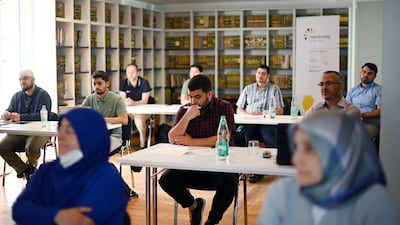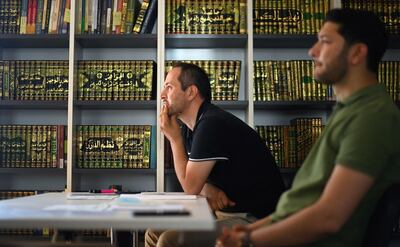Germany has opened an Islamic training college for home-grown imams in a move regarded as diluting the influence of Turkish clerics.
Backed by government funding, the college in the city of Osnabrueck will teach in German and offer free tuition for aspiring imams.
Its opening on Tuesday was welcomed by German politicians who described it as an important step in integrating Muslims in the country.
But the project was shunned by the Turkish-Islamic Union for Religious Affairs (Ditib), which currently provides about half of Germany’s imams.
Most of Ditib’s imams are financed by the Turkish government and sent to Germany on temporary work permits.
Ankara's influence in Germany has long been a thorny political subject, especially since the failed coup in Turkey in 2016.
The new college runs a two-year programme that offers practical teaching in preaching, worship practices and recitation from the Quran.
An initial intake of about 40 students attended their first classes in Osnabrueck this week.
“I want to be an imam who makes history, an imam who works in Germany, for Germany,” one of the first students at the college, Muhamed Memedi, told ARD television.
“A lot has been invested here and my impression is that I can get good training here as an imam.”
Another student, Ender Cetin, said it was important for German imams to “speak the language of the young people”.
Many of the current imams were officials of the Turkish state who "pursue a political agenda" in Germany, he said.
The school’s opening ceremonies were attended by former German president Christian Wulff, a member of Chancellor Angela Merkel’s conservatives.
The opening of the college was “an important, necessary step in the overall plan towards full equality of Muslims in our country,” Mr Wulff said.
Filiz Polat, a spokeswoman on integration for Germany’s Green party, said the college should be a model for other European countries.
“For the first time in Germany, there is practical training for imams … which is close to local communities and independent of countries of origin,” she said.
“The Islamic college will foster an independent and self-assured religious practice by Muslims in Germany.”
Aydan Oezoguz, a Social Democrat member of Parliament, said the college could “create a bit more of a sense of belonging for Muslims in Germany”.
Changing face of German Islam
Plans for the college were announced last year, with the federal government and regional authorities in Lower Saxony both helping to fund the project.
“We support an Islam that is rooted in our society, shares the values of our constitution and respects our way of life,” Interior Minister Horst Seehofer said at the time.
Ditib last year started its own training programme after choosing not to take part in the government-backed school.
The organisation remains the largest Islamic group in Germany with about 960 mosques under its umbrella.
It has close ties to Turkey’s official directorate of religious affairs, the German government says.
Turkish communities were for decades the dominant group among Germany’s Muslims, after many people from Turkey migrated under a guest worker scheme in the 1960s and 1970s.
But more recent migration from Syria and other countries has made the country's Muslim population more diverse.
About 45 per cent of Germany’s Muslims are now of Turkish origin, down from 68 per cent in 2008.



